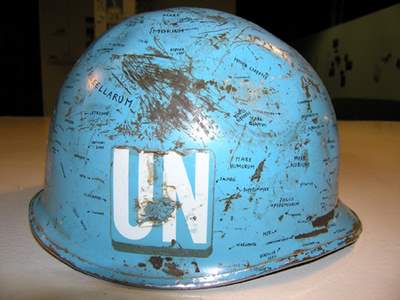The killing of seven United Nations peacekeepers in the Sudanese region of Darfur last week received considerable international media attention. As someone who follows events in Africa closely, I am always curious to see what will make it into the international news. Too often, significant events fail to be made even small mention of in the mainstream media.
Similar killings in Darfur are common. Indeed, on the day before the attack on the UN peacekeepers, seven people were killed in a clash between the Sudanese army and local militias in Central Darfur. Four days earlier, four people were killed in a shoot-out in Darfur’s largest city of Nyala, and one day prior, a husband and wife were killed in a bombing raid in Darfur’s neighbouring state of South Kordofan. That’s 13 people in the week prior to the UN attack! For even more dramatic examples, you need only go back as far as late June when inter-tribal clashes in North Darfur killed at least 62 and a bomb killed four children in Darfur’s Jebel Marra mountains. None of these tragedies received mainstream international media coverage. It’s a sad fact that we are really only interested in the death of seven Africans if they happen to be wearing blue helmets.
I am not saying that international media should cover all such fatalities. Sadly, the volume in Sudan alone, much less the rest of Africa, is too overwhelming for the press to handle. Neither am I saying that the death of UN peacekeepers is not more newsworthy than many other incidents because this incident is a political as well as a human tragedy. It deserves publication.
But it undoubtedly also caught the media’s attention because there is something of an aura about the United Nations. We like to think of peacekeepers, not as soldiers, but as ambassadors of justice and freedom; their armies pursuing holy missions.
The truth, though, is somewhat uglier. In fact, there are few within Darfur who respect the UN forces. They are held in contempt by the Sudanese Government, distrusted by rebel groups and mocked by criminal gangs who carjack their expensive four-wheel drives seemingly at will. To ordinary Darfurians, who at one point saw the incoming UN force as their savior, they are a source of frustration and bewilderment. Arguably, the only people who truly love the UN peacekeepers are the traders who gain from the petty corruption that is rife within it and the few locals who benefit from well-paid jobs. And this at an astonishingly high cost; over US$100 million per month to the international tax payer on top of a growing cost in human life.
It is easy, of course, to criticize as an outsider. Frustration at their lack of effectiveness is undoubtedly felt by the UN peacekeepers themselves, who have been handed the thankless task of keeping a peace that has never been fully agreed to, between parties who are ever-fragmenting, in an area the size of France. The UN would also point to their achievements. And it is true that their presence has undoubtedly saved lives directly and created greater access for humanitarian operations.
So, we should undoubtedly honour and respect the seven peacekeepers who have died. But, we would do better to also take the time to ask why they died and whether it was worth the price. We should also not see them as martyrs who died for a pure cause, but as ordinary people, no more or less important than the hundreds of dead that the blue helmets were unable to protect.






Does the Sudanese government hold anyone in respect? And what is the basis of the respect?
Peacekeepers aren’t there to be nation builders, surely? The Sudanese government, among many other factions, perhaps needs to find ways to ensure that diplomacy becomes the first option instead of turning back into terrorising and bloodshed to make a point or gain advantage.
If you could provide more background on what that government is doing to move to unarmed communications among factions, and how the UN/African peace force can assist with this transition, it would be helpful for greater understanding here.
Comments are closed.